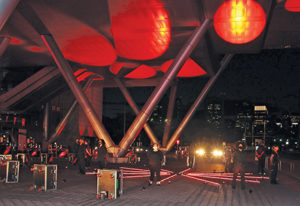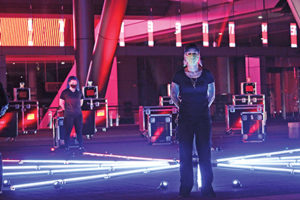
Stagehands perform a silent vigil at the Boston Convention and Exhibition Center on 9/1/20, to raise awareness for the entertainment businesses devastated by COVID-19 event cancellations and for the workers behind the scenes, 77% of whom have lost 100% of their income. Photo submitted.
Press Release
Massachusetts went on “red alert” on 9/1/20, when local stagehands and event production companies illuminated more than 80 entertainment venues and other landmarks with red lights as part of a national call to action. The #RedAlertRESTART action took place in more than 50 cities across the country, to raise awareness for entertainment businesses devastated by COVID-19 event cancellations, and for the workers behind the scenes, who have built their careers by going unnoticed.
“This difficult time has been extremely grim. Stagehands are used to being around a lot of people — our peers, our coworkers, everybody,” said Shanna Banana, IATSE Local 11 stagehand. “We’re used to being around each other in hard times, and this is very different because in this hard time, we can’t be around each other, we can’t be around anybody, and that’s been devastating financially, physically and emotionally to a lot us. If legislators don’t take action and provide relief to our industry, I don’t know what I’m going to do. I don’t know what any of us are going to do.”
Ken Casey, frontman of Boston’s own Dropkick Murphys, made an appearance at the Boston Convention and Exhibition Center site in the Seaport, to show his support for the people who over a long professional music career, he has come to consider his family.
“We need Congress to take notice of the shape the industry is in,” said Casey. “Everyone who works in this industry — the people who make these events what we know and love, and who have come to be some of my closest friends and family — they had everything taken away from them overnight. Without them, there are no concerts, there is no theater. People need to realize what is at stake here.”
The We Make Events Coalition is calling on Congress, which controversially remains on hiatus during the third most massive unemployment crisis in our nation’s history, to:
• Pass the RESTART Act, to provide support and relief for venues and production companies of all sizes.
• Extend full Pandemic Unemployment Assistance — including the extra $600 weekly, from the CARES ACT — which expired in August despite the Live Events industry remaining at 96% unemployment nationwide.

Shanna Banana performs in the silent vigil at the Boston Convention and Exhibition Center on 9/1/20, to raise awareness for the entertainment businesses devastated by COVID-19 event cancellations and for the workers behind the scenes, 77% of whom have lost 100% of their income. Photo submitted.
“While other parts of the economy have reopened, or have plans to reopen, there’s no end in sight yet for our industry,” said Colleen Glynn, business manager of IATSE Local 11, Boston’s stagehands union. “Local 11 members, who still have their health benefits through our union hall, are struggling to pay for other necessities. Many, many industry workers are worse off. It’s serious, and it’s affecting 12 million families nationwide. The time to take action is long overdue.”
According to organizers, 77% of people in the live events industry have lost 100% of their income since March, 2020.
Joe Spaulding, president and CEO of the Boch Center, home of the Wang Theater and Shubert Theater, commented on the importance of arts institutions in our community.
“I believe that the arts keep us a civilized society. I believe that the arts heal,” said Spaulding. “There will be no one in our seats until September 2021, or maybe even January 2022. We will have no earned income, not one penny, for a year and a half. So, how do organizations survive? That survival is up in the air, but you can’t lose buildings like this [the Wang Theatre]. We’re banding together as organizations, groups and individuals to make our point.”
“I got COVID-19 and suffered for at least a month,” added Spaulding, “during which time I had to let go of 275 of my family here at the center. The biggest personal obstacle was not getting COVID-19, it was the depression of the building sitting dark.”
Locations ranging from TD Garden, Boch Center and Emerson’s Colonial Theatre in Boston, to the City Halls of Worcester and Springfield all participated in the event across 26 total cities and towns in Massachusetts. At Boston’s Convention and Exhibition Center in the Seaport, an additional light display was set up for a performative vigil by lighting companies JCALPRO and 4Wall.
The vigil featured 12 stagehands representing the 12 million unemployed live events workers nationwide. They stood in silence for 12 minutes, until the final minute where they each raised one tool in the air in solidarity for the plight of the industry, followed by all lights going out with the same abruptness of event cancellations when COVID-19 struck.
The only light that remained on was the single bulb of the ghost light — which in the theater world, famously never goes dark — to symbolize the live events industry holding on until they can make a full return to the stages.
With the enduring ban on large public gatherings, people who work in all facets of the live events industry — including stagehands, truck drivers, hair and makeup artists, stitchers, audio engineers, caterers, and more — are left to wait with bated breath for some clarity on their future, and the future of the live events industry. Workers are waiting to hear if they will have venues to return to. Venues are hoping workers will be provided the relief necessary to sustain themselves, so they will be ready to return to work when the time comes.
Organizers are asking the public to call on Congress to pass the federal RESTART Act, which requests loan programs and other economic relief for shuttered businesses. Advocates also want to see an extension of Pandemic Unemployment Assistance, and an Emergency Temporary Standard to be mandated by OSHA to protect workers once they do go back to work.
We Make Events North America is a coalition of trade bodies, businesses, unions, and live events workers coming together to raise public awareness and advocate for the live events sector during the COVID-19 pandemic. Visit WeMakeEvents.org.
•••
Support local journalism, donate to the Neighb News with PayPal.
Click here to download the entire 9/10/20 issue: 09-10-20 SawmillWaterfowl



